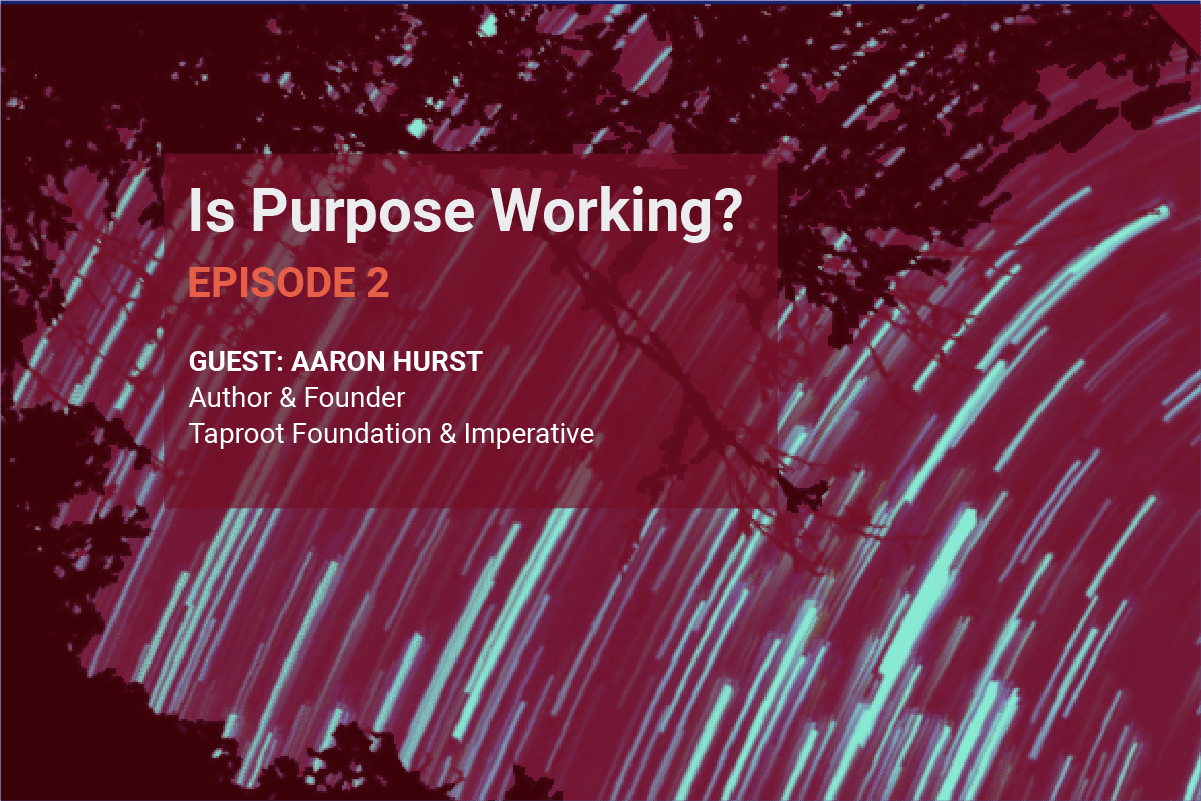Connecting Purpose to How We Work as Human Beings

In 2014, Aaron Hurst’s book, The Purpose Economy, brought the idea of purpose front and center for business, launching a revolution of sorts in how we think about personal, professional, and organizational purpose. Hurst had previously founded the Taproot Foundation, a network he set up to connect social change organizations with business professionals willing to donate time and expertise to build capacity. Hurst is a key figure in the modern purpose story, so this episode’s conversation with Chris Pirie from Learning Futures Group and Stacia Garr from RedThread Research is the perfect place to start the season’s journey toward finding out if purpose really is working.
We first hear about the personal and family journey that is the basis for all Hurst’s work, including what he’s doing with his new peer coaching platform, Imperative. We then explore the frustrations that led him to move on from pro bono work: a recognition that people need to feel a purpose in what they do at work; too many are “driving blind” because they can’t get to one; and that purpose needs to be systematically integrated into the flow of work.
Purpose is set to become what creates value for people as employees and consumers, as well as sparking loyalty to organizations and brands. It is also, we learn, not to be confused with merely supporting good causes — and actually much more about new insights into human psychology and deep needs we all have. (Think, more autonomy = more sense of purpose.)
All these shifts have big implications for HR and talent management. There certainly is a need for new metrics on how to measure purpose’s success in the workplace (and Hurst has some key messages for leaders, especially not just tracking growth, but also relationships and impact — as he does for HR and what its opportunity is with purpose).
The conversation stress-tests some of Hurst’s ideas against COVID, the gig economy, and other realities: deciding what’s real and what’s not can be tricky right now. Then, we ask the key question of the episode: how does purpose specifically connect to workplace learning? This requires a shift in organizational mindsets away from command-and-control thinking and the idea of optimizing human “resources” towards helping people as human beings.
L&D’s role here could be as a key part of the change management process, we decide —getting organizations into this new mindset. A core concept here: L&D can act as a builder and embracer of a coaching and learning culture that supports continuous employee growth and development. Conclusion: It’s time to retire talk of “hard” versus “soft” skills — and move to teaching human skills instead.

Purpose-Driven Leader, Purpose-Driven Workplace, Purpose-Driven Learning
You can tune in to the conversation from any of your favorite podcast apps or subscribe to our newsletter, where we will summarize the key takeaways on thought leadership for learning leaders, and give you access to exclusive content, transcripts, related links, and more.
Stay connected with purpose – Subscribe to our newsletter to receive the latest episodes.
Podcast
Let's talk about it! NovoEDTalks Podcast unveils real-world strategies from L&D professionals because learning is changing and evolving — fast!
Podcast
Listen to Charlie Chung of NovoEd discuss L&D fads, buzzwords and "zoom and doom" in this Brandon Hall Group HCMx Radio 178 podcast.
Podcast
Listen to Todd Moran, NovoEd Chief Learning Strategist, discuss upskilling and reskilling at scale in this Brandon Hall Group HCMx Radio 178 podcast.
Podcast
EPISODE 10 - What does global services firm EY mean when it says it’s all about ‘building a better working world’?
Podcast
EPISODE 9 - For Suzanne Gibbs Howard of IDEO U, if it’s to survive, L&D needs to about be a lot more than just MOOCs and recorded talking heads.
Podcast
EPISODE 8 - We move away from finding out about purpose at work to a very different universe: market-driven venture capitalism. Can purpose be there, too?